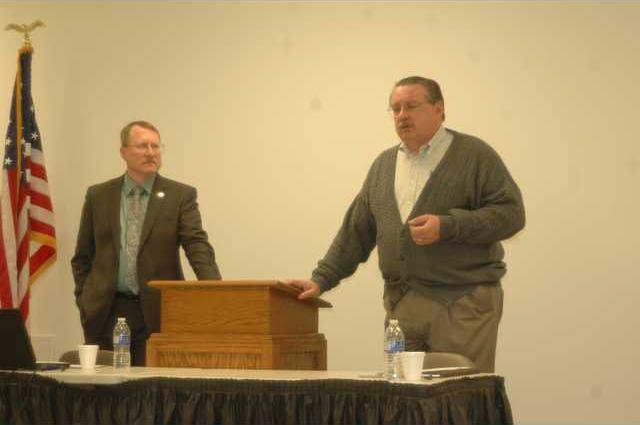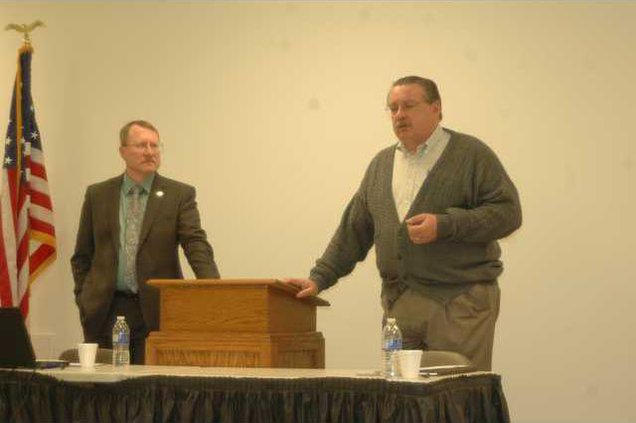Rep. John Edmonds shared his analysis of the governor’s plan to reduce state income taxes, and Sen. Mitch Holmes discussed the Coalition of Innovative School Districts bill when they returned to Great Bend for a legislative coffee, Saturday at the Kansas Oil & Gas Museum.
Last Thursday, the senate passed one bill, SB 176, which creates the afore-mentioned coalition, on a vote of 31-7. Holmes, R-St. John, said the bill would allow some school districts to opt out of state laws, rules and regulations, in exchange for higher student achievement. If signed into law, school districts could apply to join the coalition through the State Board of Education.
Coalition schools would still have to participate in assessments, abide by financial and auditing requirements, and comply with health, safety and access laws, as well a federal laws. They’d be subject to a number of acts concerning special ed, virtual schools, capital outlay and school board elections, among others. They could not charge tuition in the district’s boundaries. Up to 10 percent of the schools in the state could be in the coalition.
Great Bend USD 428 Superintendent Tom Vernon, who attended the coffee, voiced concerns with the plan. He said the most onerous regulations, such as No Child Left Behind and its sanctions, are federal. “This does nothing for that.”
“The idea is to try to give people freedom to innovate, and I can’t argue with that,” Holmes said.
Holmes quickly reviewed senate bills from the previous week, which he addressed March 2 at a legislative coffee in Hoisington.
Concerning the bill that will require drug testing for welfare recipients suspected of substance abuse, he said, “This has been done in about 18 states.”
“Three states, and it was ruled unconstitutional in Florida,” an audience member said. (Editor note: According to Fox News, last month a federal appeals court upheld a temporary ban on a law requiring drug testing of Florida’s welfare recipients.)
“Well, we’re going to try it here,” Holmes said, adding his number includes states considering similar legislation.
The 800 pound gorilla
Edmonds present the Great Bend audience with the same handout he used a week earlier at Hoisington: A spread sheet on the fiscal impact of Gov. Sam Brownback’s tax plan. The information same from the Kansas Legislative Research Department on Feb. 6.
The 800 pound gorilla in any room is the governor’s tax plan,” he said. While described as a plan to eliminate state income taxes, Edmonds notes it only reduces the tax rate gradually in the coming years, even into Brownback’s second term if he’s reelected.
“Nowhere does this plan reduce income taxes to zero,” he said.
In 2014 singles earning less than $15,000 and married coupling jointly earning less than $30,000 would see their tax rate drop from 3 percent to 2.5 percent. In 2016, those rates would drop to 1.9 percent. In 2017, those in the higher tax bracket would see it cut from 4.9 percent to 3.5 percent.
The savings to Kansas taxpayers amounts to $37.9 million in 2014 and $1.8 billion over five years.
Edmonds said he doesn’t oppose a reduction in income taxes. However, he said, “this (plan) as a whole increases taxes.”
“This is a tax increase coupled with a tax shift,” Edmonds said, adding it has no chance of coming out of committee from the house of representatives in its current form. “If the bill were to come across as it is today, I would not support it.”
The sales/use tax which is supposed to be rolled back to 5.9 percent this year would be permanently increased to 6.3 percent. That’s a $262.3 million tax increase for 2014 and $1.5 billion increase over five years, he said.
Eliminating the mortgage interest deduction on income taxes will increase taxes by $162 million in 2014 and $730.2 million over five years.
Eliminating the property tax paid deduction will increase taxes $68.5 million in 2014 and $307.8 million over five years.
The net tax increase is $455.4 in 2014 and the running total will peak at more than $1.1 billion is 2017, although tax savings start to be greater than tax increases in 2018.
Holmes votes for innovative schools coalition
Edmonds says he opposes governor's tax plan as presented





